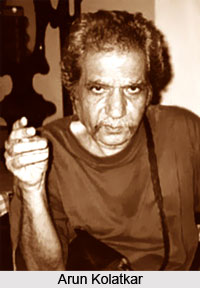 Arun Kolatkar was a Marathi poet who also wrote in English. The speciality of his poems was that they found humour in everyday matters. Kolatkar was born in Kolhapur of Maharashtra. In his childhood Kolatkar had attended a Marathi school and later in his life he had enrolled himself in the J.J School of Art. In his early life Kolatkar had spent long time in several advertising agencies.
Arun Kolatkar was a Marathi poet who also wrote in English. The speciality of his poems was that they found humour in everyday matters. Kolatkar was born in Kolhapur of Maharashtra. In his childhood Kolatkar had attended a Marathi school and later in his life he had enrolled himself in the J.J School of Art. In his early life Kolatkar had spent long time in several advertising agencies.
The Marathi poems written by Kolatkar had a modernist influence in them. The early poems which the poet had written in Marathi included surrealism, experimentalism and had strong avant-garde European influence. It can be also said that the poems were similar to the Beat Generation poetry. The poems were oblique and whimsical in nature and at the same it included the dark, sinister and funny side of human life. The Marathi poems written by Kolatkar were darker and more humorous in nature than the English poems which he had penned down. His early Marathi poems were audacious in nature and took more liberty with language. In other words it can be said that the Marathi poems of Kolatkar experimented a lot with language.
On the other hand, the later Marathi poems which he had written were more accessible in nature. The poems were also less radical and less nightmarish compared to the older Marathi poems which he had written. For instance poems like Chirimiri, Bhijki Vahi and Droan uphold the trends of his later poetry in Marathi. With passing time the poems written by Kolatkar had become socially more aware and the satire which was used in the poem had become more direct in nature. An important aspect of Kolatkar was that he was a poet of post-independence era and had the tendency to merge their regional style along with the international style and create a new style of poetry in the process. Marathi devotional poetry and popular theatre had strong influence in the early poems written by Kolatkar while the later poems of Kolatkar had the influence of American Beat Poetry.
In the early stage Kolatkar was hesitant to publish his English poems but finally being influenced by friends Kolatkar had taken out Jejuri. His English poems generally use a series of imageries which reflected the ambiguities of modern-day life. Gradually with time Kolatkar matured his style of time and his poem with the name, "Kala Ghoda" which was an epitome in Indian English poetry.
It can be said that Kolatakar`s poem had scepticism and it also saw the divine in the natural vitality of life. In the poems he generally used a colloquial and sceptical tone.
Some of the notable Marathi poems of Arun Kolatkar are Arun Kolatkarcha Kavita in 1977, Chirimiri, Bhijki Vahi and Droan in 2004. The popular English poems written by the famous Marathi poet were Jejuri, Kala Ghoda Poems and Sarpasatra.
Arun Kolatkar had made a place for himself in the realm of modern literature. His talent was rewarded by a number of awards. Some of the awards which he had received in his life time were Kusumagraj Puraskar given by the Marathwada Sahitya Parishad in 1991, Bahinabai Puraskar given by Bahinabai Prathistan in 1995 and a lot more.



















